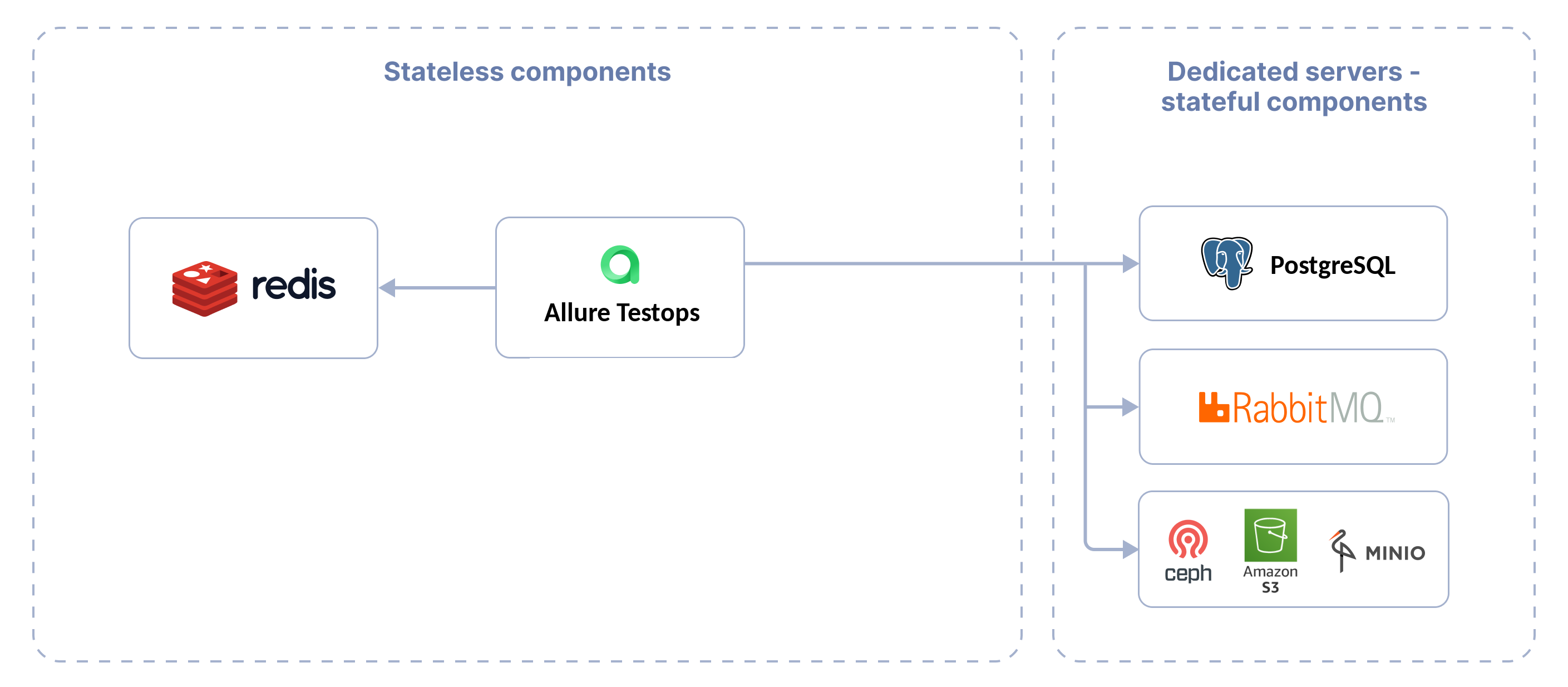Allure TestOps architecture
An Allure TestOps installation includes the Allure TestOps service itself and a few third-party services:
stateful components:
- PostgreSQL database server;
- RabbitMQ message server;
- S3-compatible storage server, such as Ceph or MinIO.
For a production environment, these services must be deployed separately from the Allure TestOps service.
stateless components:
- Allure TestOps service itself;
- Redis server for storing user sessions.
These services can be deployed on the same machine. Depending on the installation method and the configuration, Redis can be deployed and pre-configured automatically.
End users should only communicate with the Allure TestOps service, optionally via a reverse proxy (see network configuration). The other components must be available to Allure TestOps over the network but must not be available directly to end users.

Hardware requirements
The optimal hardware configuration for your Allure TestOps instance depends on the workload. For a small project, we recommend starting with 4 vCPU and 8 GB of RAM and scale up as needed.
Currently supported operating system versions for installing Allure TestOps using:
- DEB packages — Ubuntu versions 20.04 LTS, 22.04 LTS or 24.04 LTS;
- RPM packages — CentOS 8 and above or RedHat Enterprise Linux 8 and above.
Storage requirements
Database
Allure TestOps relies on PostgreSQL as the main data storage.
The required disk space depends entirely on the amount of test results that you are going to process with your Allure TestOps instance. A project with 100 000 tests will take up about 300 GB in the database after 1 year of daily runs.
For acceptable performance of the whole system when processing test results from automated tests, especially if your test base is big and runs occur several times a day, you need to meet the following requirements:
- Use only SSDs as the database storage, preferably enterprise-grade. HDDs will slow down the services.
- Configure the database correctly for proper SSD performance, as described in our manual.
- The database should not be stored on the same disk as the artifact storage. This will create resource contention and ultimately slow down both the database and the storage.
Currently supported PostgreSQL versions — 15 and higher.
Object storage
The object storage is used to store test result artifacts and test cases (for example, screenshots and videos produced during test runs). The volume of such artifacts depends on the tests that you will be running. For a small project, we recommend to start with at least 50 GB of disk space and then scale up as needed.
For acceptable performance of the whole system for the processing of the test artifacts from automated tests, you need to meet the following requirements:
- Use only SSDs as the data storage for artifact storage, preferably enterprise-grade. HDDs will slow down the services.
- Use any S3-compatible storage:
- If you use Kubernetes, connect the storage using a CSI driver.
- Use a standard storage class designed for frequent data access. Using "cold" storage classes can negatively affect overall Allure TestOps performance.
- Artifact storage should not be stored on the same disk as the database. This will create resource contention and ultimately slow down both the database and the storage.
Message queue
A RabbitMQ message queue server is used internally by Allure TestOps.
Currently supported RabbitMQ versions:
- for a single Allure TestOps instance — the latest stable version from the RabbitMQ documentation;
- for multiple Allure TestOps instances — any RabbitMQ version below 4.0.
Allure TestOps does not support quorum queues in high-availability mode for RabbitMQ version 4.0 and above. If RabbitMQ installation requires high availability mode, use RabbitMQ version below 4.0.
Session storage
A Redis server is used for storing user authentication sessions by Allure TestOps.
Redis does not require persistent storage since it operates using RAM.
Currently supported version is the latest stable version from the Redis documentation.